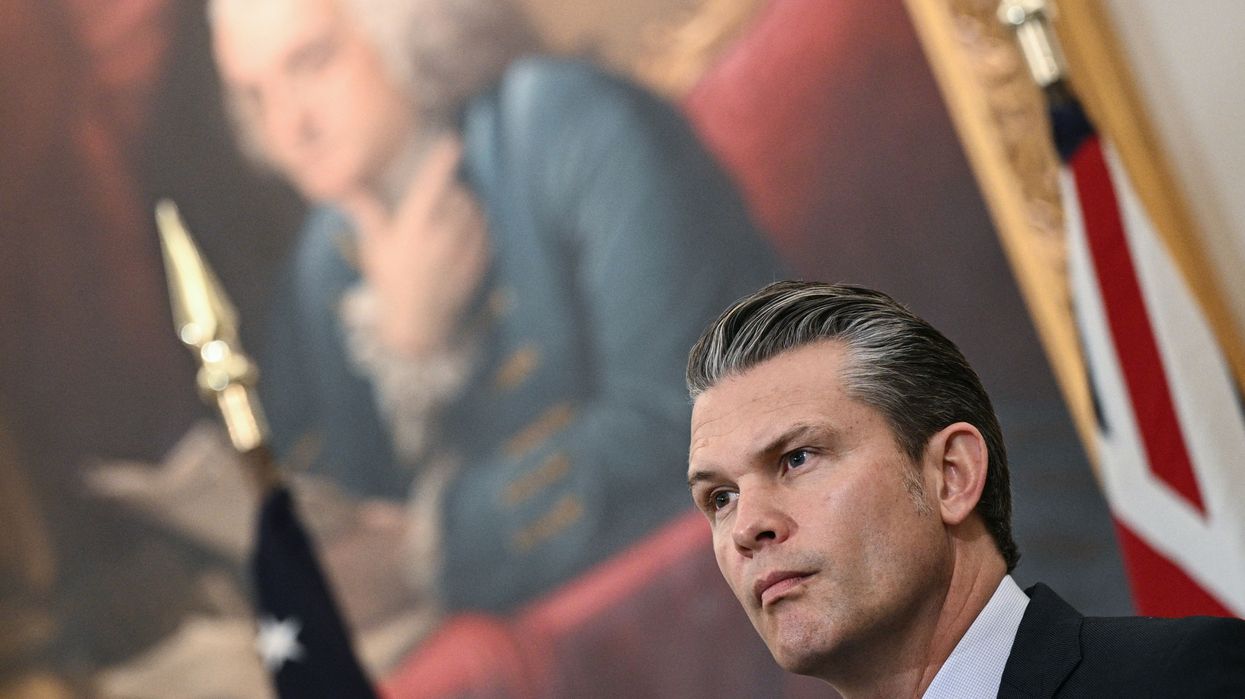April, 25 2016, 08:00pm EDT

FCC Moves to Approve Wasteful Cable Merger, Sticking American Consumers with the Bill
The Federal Communications Commission today circulated an order to approve Charter Communications' $90 billion takeover of Time Warner Cable and Bright House Networks.
The deal was also approved by the Justice Department. The merger combines the nation's second-, third- and sixth-largest cable-TV and Internet providers. With this approval just two Internet service providers, Charter and Comcast, would control nearly two-thirds of the nation's high-speed Internet subscribers.
WASHINGTON
The Federal Communications Commission today circulated an order to approve Charter Communications' $90 billion takeover of Time Warner Cable and Bright House Networks.
The deal was also approved by the Justice Department. The merger combines the nation's second-, third- and sixth-largest cable-TV and Internet providers. With this approval just two Internet service providers, Charter and Comcast, would control nearly two-thirds of the nation's high-speed Internet subscribers.
The FCC is poised to impose three seven-year merger conditions, among other conditions codifying voluntary commitments made by Charter. These are focused on "removing unfair barriers to video competition," according to a statement from Chairman Tom Wheeler. The merged entity would not be permitted to charge usage-based prices, to impose data caps, or to charge interconnection fees to services including online video providers that deliver large volumes of Internet traffic to broadband customers.
Free Press President and CEO Craig Aaron made the following statement:
"There's nothing about this massive merger that serves the public interest. There's nothing about it that helps make the market for cable TV and Internet services more affordable and competitive for Americans.
"Customers of the newly merged entity will be socked with higher prices as Charter attempts to pay off the nearly $27 billion debt load it took on to finance this deal. The wasted expense of this merger is staggering. For the money Charter spent to make this happen it could have built new competitive broadband options for tens of millions of people. Now these billions of dollars will do little more than line the pockets of Time Warner Cable's shareholders and executives. CEO Rob Marcus will walk away with a $100 million golden parachute.
"Thanks to this merger both Charter and Comcast now have unprecedented control over our cable and Internet connections. Their crushing monopoly power will mean fewer choices, higher prices, no accountability and no competition. Conditions won't lower the monthly bills for those who'll be hit hardest by these rate hikes: low-income households and communities of color.
"Chairman Wheeler has just tarnished his legacy as head of the FCC. As he nears the end of his term, this wasteful merger undermines his oft-stated priority of 'competition, competition, competition.' I guess he decided it was time for a new mantra."
Free Press was created to give people a voice in the crucial decisions that shape our media. We believe that positive social change, racial justice and meaningful engagement in public life require equitable access to technology, diverse and independent ownership of media platforms, and journalism that holds leaders accountable and tells people what's actually happening in their communities.
(202) 265-1490LATEST NEWS
New Worries at Chernobyl After IAEA Finds Radiation Shield Has 'Lost Primary Safety Functions'
"Timely and comprehensive restoration remains essential to prevent further degradation and ensure long-term nuclear safety," said IAEA director general Rafael Mariano Grossi.
Dec 08, 2025
A protective shield built over the remains of the Chernobyl nuclear power plant in Ukraine is no longer capable of blocking radiation, the International Atomic Energy Agency warned late last week.
In a statement published on Friday, the IAEA said that its researchers have confirmed that the New Safe Confinement (NSC) shield has "lost its primary safety functions," including the ability to confine radiation, after it was damaged by a Russian drone strike in February.
On the positive side, the researchers found "no permanent damage" to the system's load-bearing structures and monitoring systems. Nonetheless, IAEA director general Rafael Mariano Grossi said that urgent work needed to be done to rebuild the shield.
"Limited temporary repairs have been carried out on the roof, but timely and comprehensive restoration remains essential to prevent further degradation and ensure long-term nuclear safety," he emphasized.
Grossi noted that IAEA had a permanent team working at the site and vowed that the agency "will continue to do everything it can to support efforts to fully restore nuclear safety and security at the Chernobyl site."
Shaun Burnie, a senior nuclear specialist at Greenpeace, told the New York Times that the damage caused to the NSC isn't cause for immediate concern, although that would change if the damage to the shield went without repairs for a long period of time.
"If there was to be some event inside the shelter that would release radioactive materials into the space inside the New Safe Confinement, because this facility is no longer sealed to the outside environment, there’s the potential for radiation to come out," said Burnie. "I have to say I don’t think that’s a particularly serious issue at the moment, because they’re not actively decommissioning the actual sarcophagus."
The NSC was first put into place in 2016 to enclose the emergency sarcophagus over Chernobyl's number 4 nuclear reactor that was constructed by Soviet officials in the wake of the 1986 disaster at the nuclear plant.
Keep ReadingShow Less
230+ Environmental Groups Call On Congress to Impose Moratorium on New AI Data Centers
“The rapid, largely unregulated rise of data centers to fuel the AI and crypto frenzy is disrupting communities across the country and threatening Americans’ economic, environmental, climate, and water security.”
Dec 08, 2025
Environmental and economic justice advocates alike have been sounding the alarm for months regarding the Trump administration's push to built massive data centers to support artificial intelligence and cryptocurrency in communities across the United States—regardless of local opposition—and on Monday Congress heard from a coalition of more than 200 groups demanding action to stop what they called "one of the biggest environmental and social threats of our generation."
Led by Food and Water Watch (FWW), which originally demanded a moratorium on new AI data centers in October, more than 230 organizations have signed a letter warning that thus far, Congress has failed to take action to stop the rapid expansion despite the fact that "the harms of data center growth are increasingly well-established, and they are massive."
The national and state groups, including Greenpeace USA, Oil Change International, and the Nebraska-based Save Rural America, pointed to a number of harms associated with the expansion of data centers in places including rural Michigan, Wisconsin, and northern Virginia.
They warned that pushing the build-out onto communities—many of which have protested the approval of the centers to no avail—will lead to:
- Enormous electricity consumption, with a tripling of data centers in the next five years projected to result in the facilities consuming as much electricity as about 30 million households;
- Unsustainable water consumption, with those data centers requiring the amount of water normally used by 18.5 million households, just for cooling the computer servers;
- The worsening of the climate emergency, with 56% of the energy used to power data centers sourced from planet-heating fossil fuels;
- Surging electricity costs for people living in the vicinity of energy-sucking data centers; and
- Skyrocketing job losses as half of all entry-level white-collar jobs are projected to become obsolete due to the growth of AI and companies' investments in the technology, even as corporations report they're not seeing a significant positive impact on their bottom lines.
"The rapid, largely unregulated rise of data centers to fuel the AI and crypto frenzy is disrupting communities across the country and threatening Americans’ economic, environmental, climate, and water security," the groups told Congress. "We urge you to join our call for a national moratorium on new data centers until adequate regulations can be enacted to fully protect our communities, our families, our environment, and our health from the runaway damage this industry is already inflicting."
The groups noted that electricity costs have risen 21.3% since 2021, a rate that "drastically" outpaces inflation, driven by the "rapid build-out of data centers."
As CNBC reported last month, residential utility bills rose 6% in August compared with last summer, and though price increases can be due to a host of reasons, electricity prices rose "much faster than the national average" this year in states with high concentrations of data centers. Consumers in Virginia paid 13% more, while those in Illinois paid 16% more and people in Ohio saw their costs go up 12%.
Emily Wurth, managing director of organizing at FWW, told the Guardian that rising utility costs are driving much of the grassroots action against data centers in places like Wisconsin—where a woman was violently dragged out of a community meeting by police last week after speaking out against plans for a new facility in her town—and Tucson, Arizona, where residents successfully pushed the City Council this year to block a data center project linked to Amazon.
“I’ve been amazed by the groundswell of grassroots, bipartisan opposition to this, in all types of communities across the US,” Wurth told the Guardian. “Everyone is affected by this, the opposition has been across the political spectrum. A lot of people don’t see the benefits coming from AI and feel they will be paying for it with their energy bills and water... We’ve seen outrageous utility price rises across the country and we are going to lean into this. Prices are going up across the board and this is something Americans really do care about.”
Data center projects worth a total of $64 billion have been blocked or delayed in states including Texas, Oregon, and Tennessee, and Reuters reported last week that a sizable portion of the opposition is coming from parts of the country that heavily supported President Donald Trump in last year's election.
Hundreds of people attended a recent meeting in Montour County, Pennsylvania, where Trump won by 20 points last year, raising alarm over plans to rezone 1,300 acres for Talen Energy to build a data center.
While raising prices for households that are already coping with high grocery and healthcare bills, the unregulated growth in AI data centers is also expected to add up to 44 million tons of carbon dioxide to the atmosphere in just the next five years—the equivalent of putting 10 million new fossil fuel-powered cars on the road at a time when planetary heating has already been linked to recent US weather disasters like Hurricane Helene and deadly heatwaves.
The groups appealed to Congress as Trump said he plans to sign an executive order preempting state-level AI regulations, saying that states, "many of them bad actors," should not be "involved in RULES and the APPROVAL PROCESS.”
Republicans in Congress have also recently suggested they could try to ban state-level AI regulations in the National Defense Authorization Act.
The Trump administration and its allies in the industry have issued warnings to communities that oppose the construction of AI data centers, with the White House's AI Action Plan demanding the fast-tracking of permits for building the facilities and former Sen. Kyrsten Sinema (I-Ariz.) lobbying for the industry and recently telling local officials in Chandler, Arizona that "federal preemption is coming" and they must approve plans for a 20,000-square foot data center in the city.
A Morning Consult poll taken last month found that public support for the centers is falling as rapidly as companies try to take over rural and suburban communities with new data centers. More than 40% said they supported a ban on the construction of new facilities, up from 37% just a month prior.
Keep ReadingShow Less
Retired General Says Hegseth Boat Strike on Shipwrecked Sailors Was a 'War Crime'
"Secretary Hegseth is basically convening everyone to think... this is the kind of thing that happens in war," said retired Lt. Gen. Mark Hertling. "It's not."
Dec 08, 2025
A retired general suggested Monday that the Trump administration’s strike on shipwrecked survivors on September 2 may have been a war crime.
In the face of mounting scrutiny, Secretary of Defense Pete Hegseth has continued to defend what has been described as a "double-tap" strike off the coast of Trinidad, alleging that the two survivors were drug traffickers bound for America who could have still theoretically harmed it in some way despite clinging to the wreckage for their lives following the first strike.
NBC reported this weekend that Adm. Frank "Mitch" Bradley, who oversaw the strikes, told lawmakers that Hegseth had given direct orders for all 11 men aboard the vessel to be killed because "they were on an internal list of narco-terrorists who US intelligence and military officials determined could be lethally targeted.”
Last week, when reports first emerged of a second strike, Hegseth denied that it had taken place, calling it “fake news” before the White House later confirmed and defended the killing of the survivors.
Lt. Gen. Mark Hertling, who served as the commanding general of the US Army Europe from 2011 to 2012, discussed the strikes on Monday in an appearance on MS NOW's (formerly MSNBC's) "Morning Joe."
"It is, in fact, in my view, a war crime," Hertling said.
"Imagine yourself falling off a cruise ship and being asked to hang on to a piece of wood after you've just been struck with a large kinetic round that has killed nine of your 11 copilots on this boat," Hertling said. "It doesn't matter what they're doing at that point."
Hertling suggested that the frequent use of the term "double-tap" to refer to the strike was a misnomer, as was Hegseth's invocation of the phrase "fog of war" to defend the military's actions.
“That’s a term that special operators use when there are two successive rounds at a target to eliminate it, and to get rid of someone who is attacking them,” the general explained regarding the claims of a "double-tap" strike. “This was a restrike, with time between the first strike and the second. That gives you time to figure out what you’re going to do and clear that so-called ‘fog of war.'”
He cited the definition from Carl von Clausewitz, the 18th-century Prussian general and military theorist who coined the term to describe the “uncertainty” of battle.
"Secretary Hegseth is basically convening everyone to think he has been in war for 20 years, and this is the kind of thing that happens in war. It's not," Hertling continued. "What I'll tell you, having been involved in strikes like this on the ground, the only time you consider a restrike is when the enemy continues to fight, and you're continuing to either strike them with artillery or some type of faraway missile. So a restrike like this occurs when you realize the individuals on the ground or in the water are trying to fight back."
Hegseth and Bradley’s defense of the strikes has centered around the idea that even as they floated helplessly on a piece of debris, the victims still posed a “continuing threat” as they could have theoretically called in other traffickers as backup to retrieve them and their cargo.
As of yet, the administration has presented no evidence that the men were calling for backup, and videos of the incident viewed by members of Congress during a closed-door hearing reportedly suggest they lacked any means of communication. Bradley, meanwhile, acknowledged in his Senate testimony that the survivors did not appear to have any radio or communication devices.
Further undermining the Trump administration's argument that the boat posed an immediate threat, Bradley also reportedly told Congress that the ship was not even bound for the US, but for the South American nation of Suriname.
Hertling emphasized that the two men were shipwrecked on "a piece of debris floating in the middle of the Caribbean," adding that "these individuals are not going to go anywhere, which will become clear with the film," though Hertling acknowledged that he had not personally seen it.
In recent days, leading Democrats, as well as some Republicans in Congress, have called for the release of the video, which House Permanent Select Committee on Intelligence Ranking Member Jim Himes (D-Conn.) described last week as “one of the most troubling things I’ve seen in my time in public service.” Himes said that while the video showed the men were carrying drugs, “they were not in a position to continue their mission in any way.”
The strike was the first in a months-long campaign of extrajudicial bombings by the Trump administration on boats that they have claimed without evidence have contained drug traffickers bound for the US. At least 87 people have been killed in the two dozen strikes since September. Some of those killed in the strikes were later reported to have been ordinary fishermen, and others who had nothing to do with the drug trade.
While focus has been centered on the details of the September 2 strike in recent days and Hegseth's role, experts have emphasized that the entire boat-bombing campaign is illegal.
"The initial attack was illegal too,” said Kenneth Roth, the former longtime director of the advocacy group Human Rights Watch, on social media last week. "Whether Hegseth ordered survivors killed after a US attack on a supposed drug boat is not the heart of the matter. It is blatantly illegal to order criminal suspects to be murdered rather than detained. There is no 'armed conflict' despite Trump's claim."
While the "Morning Joe" segment focused on the question of whether the second September 2 strike was a war crime, some legal experts have said those involved in ordering and carrying out that attack and the other bombings could actually be liable for murder under US law, since Congress has not authorized an armed conflict in the Caribbean.
Keep ReadingShow Less
Most Popular


